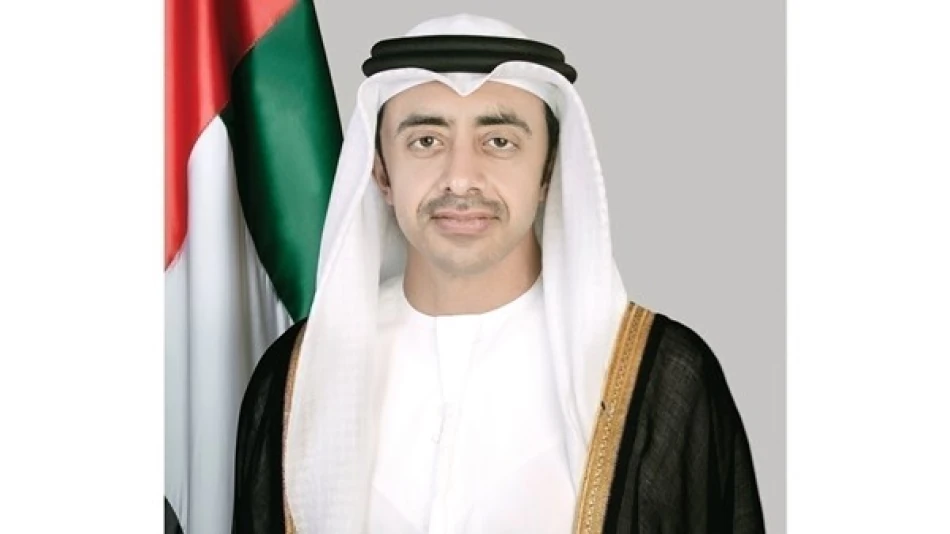
UAE's Abdullah bin Zayed hosts Egyptian FM, Discuss Brotherly Ties and Regional Developments
UAE and Egypt Deepen Strategic Partnership Amid Regional Security Crisis
The UAE and Egypt have reinforced their strategic alliance during high-level talks in Abu Dhabi, with both nations condemning recent Israeli actions against Qatar while exploring expanded economic cooperation. The meeting between UAE Foreign Minister Sheikh Abdullah bin Zayed Al Nahyan and Egyptian Foreign Minister Badr Abdelatty signals a coordinated Gulf-Arab response to escalating regional tensions and underscores the growing importance of intra-Arab partnerships in an increasingly volatile Middle East.
Diplomatic Solidarity Against Regional Aggression
The timing of this diplomatic engagement reflects the UAE's calculated approach to regional leadership during a period of heightened instability. Both ministers expressed complete solidarity with Qatar following what they characterized as "blatant and cowardly Israeli aggression" against the Gulf state, marking a significant moment of GCC unity after years of intra-Gulf tensions.
Sheikh Abdullah bin Zayed emphasized that respect for state sovereignty represents a fundamental pillar of international relations, positioning the UAE as a defender of international law while calling for the global community to halt what he termed "reckless and barbaric Israeli attacks."
Strategic Messaging Behind the Condemnation
This strong language represents more than diplomatic protocol. The UAE's vocal support for Qatar demonstrates the complete normalization of relations following the 2021 Al-Ula Declaration that ended the Gulf blockade. More significantly, it positions both the UAE and Egypt as moderate voices advocating for the two-state solution while maintaining their broader regional influence.
Economic Partnership as Regional Anchor
Beyond the immediate crisis response, the ministers focused extensively on expanding their strategic economic partnership across multiple sectors including trade, development, and investment. This economic dimension reflects both nations' recognition that regional stability increasingly depends on economic interdependence rather than purely security arrangements.
Investment Flows and Development Synergies
The UAE-Egypt economic relationship has already reached significant milestones, with UAE investments in Egypt exceeding $7 billion in recent years, particularly in energy, real estate, and infrastructure projects. The emphasis on "vital sectors" suggests both countries are preparing for expanded cooperation in emerging technologies, renewable energy, and digital transformation initiatives.
For Egypt, deeper UAE partnership offers crucial foreign currency inflows and technological expertise as it navigates ongoing economic challenges. For the UAE, Egypt provides a massive consumer market and strategic depth in North Africa, complementing its Gulf-centered economic model.
Geopolitical Calculations in a Shifting Region
This diplomatic convergence occurs against the backdrop of significant regional realignments. Both nations have maintained pragmatic approaches to regional conflicts while building economic resilience through diversified partnerships. The joint emphasis on achieving "comprehensive peace" based on the two-state solution reflects their shared interest in regional stability that supports continued economic growth.
Balancing Act with Global Powers
The UAE and Egypt's coordinated response demonstrates their ability to maintain independent regional policies while preserving relationships with major powers including the United States, China, and Russia. This diplomatic flexibility has become increasingly valuable as traditional alliance structures face pressure from changing global dynamics.
The presence of senior UAE officials including Minister of State Sheikh Shakhbout bin Nahyan Al Nahyan and Minister of State Lana Nusseibeh at the meeting underscores the high priority both nations place on this partnership, suggesting more concrete cooperation agreements may follow in the coming months.
Most Viewed News

 Layla Al Mansoori
Layla Al Mansoori






